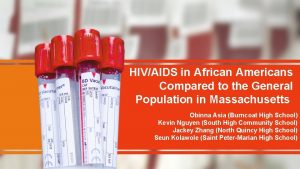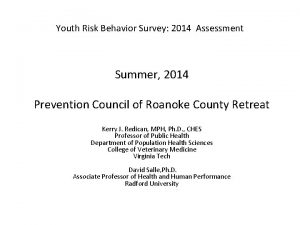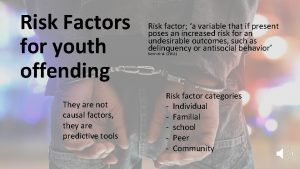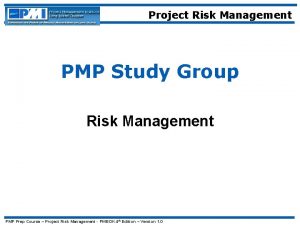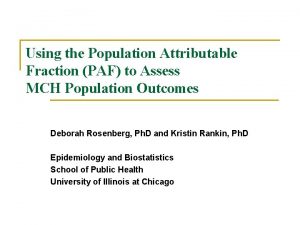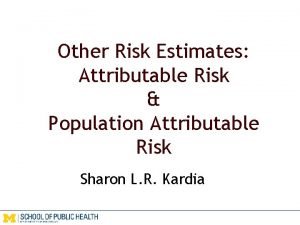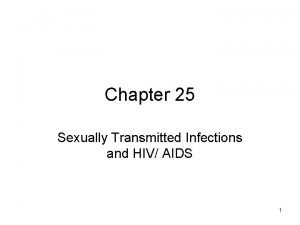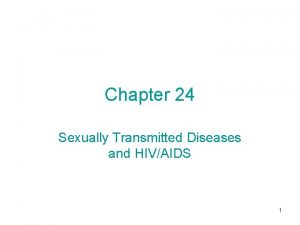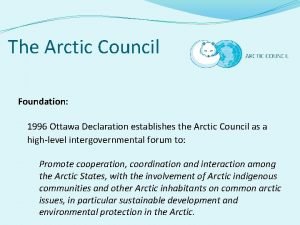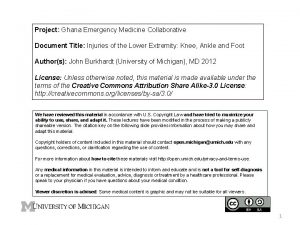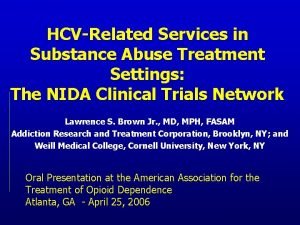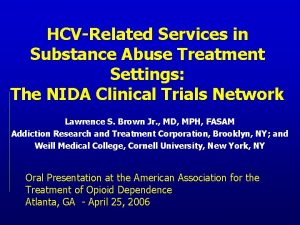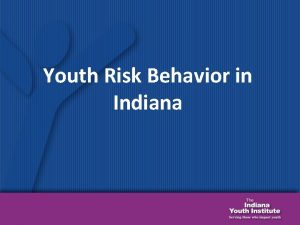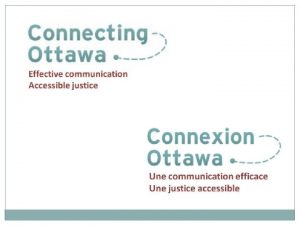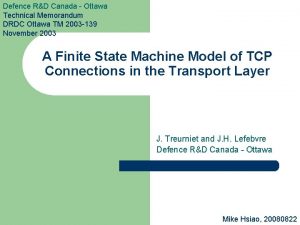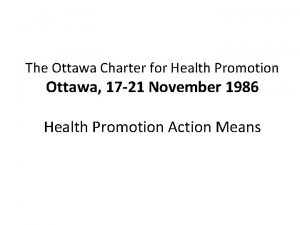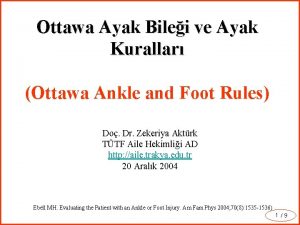HIV and HCVrelated Risk Among Ottawa Youth Who

















- Slides: 17

HIV- and HCV-related Risk Among Ottawa Youth Who Smoke Crack: Findings from Project Rock Lynne Leonard Ph. D, Andree Germain MSW, Andrea Poncia BA, Karen White-Jones MSW HIV and HCV Prevention Research Team University of Ottawa Risk, Resilience and Best Practices: Meeting the Needs of People Who Use Drugs 18 November 2013 – 10: 45 am

WHY Did We Undertake This Study ? Concern in the Community Data from two of our previous studies working with people in Ottawa who smoke crack raised community concern about the number of younger people smoking crack Street-involved youth a population particularly vulnerable to crack use initiation Little known about this population and their HIV and HCV prevention needs Proposal collectively crafted for research funding from CIHR for the study, Learning From the Voices of Youth: A Participatory Research Study Exploring the HIV and HCV Prevention Needs of Youth Who Smoke Crack(“Project Rock”) Inform the development of targeted youth-specific HIV and HCV prevention interventions for community agencies and dissemination to program decision makers

WHY Is It Important to Undertake This Study? Evidence of Harms Smoking crack with previously-used “pipes” with blood splatter without the use of a mouthpiece, in the presence of oral injuries, documented to be associated with HIV and HCV transmission and acquisition

WHY Is It Important to Undertake This Study? Evidence of Harms Smoking crack with readily available materials contributes to chronic blisters, cuts, burns to lips and oral cavity – act as site for HIV and HCV acquisition and resultant blood spatter on devices to HIV and HCV transmission

WHY Is It Important to Undertake This Study? Evidence of Harms Impact on sexual behaviours men become more sexually active (aggressively) women sexually passive unprotected sexual intercourse prevalent Safer Inhalation Program Access Restricted at Ottawa’s SIP to persons 18 years of age and over

HOW Did We Undertake This Study ? Driven by a Team of Youth Project Team Practical and lived experience of smoking crack - recruited by community frontline workers - invited by Study Coordinator Informed Consent Met weekly for four months – honoraria – support post-group meetings and beyond Activities Named the study Identified populations of youth to be included in the study; Developed thematic guide for qualitative interviews; and Developed recruitment strategies and promotional materials.

The Research Team Principal Investigator Primary Knowledge User Co-investigators Collaborators Dr. Lynne Leonard Dan Sabourin, Youth Services Bureau Rob Boyd, Oasis Program, Sandy Hill CHC Meredith Coffin, Sandy Hill CHC (Youth Addictions Counselor) Kari Daibo, Odawa Friendship Centre Jack Mc. Carthy, Somerset West CHC Katie Sanders, Operation Come Home Frank Mc. Gee, AIDS Bureau, MOHLTC Dr. Gaya Jayaraman, Surveillance and Epidemiology Section, PHAC

Project Conception Youth Research Team. Weekly meetings – 4 months. Informed Consent. Practical and lived experience of smoking crack. Honoraria. Follow-up support Thematic Guide for Qualitative Interviews Organizations integrated Project Rock recruitment into their activities. Variability achieved through recruiting partners. Iterative process. Nine interviews completed. Thematic analysis. Two member checking workshops. Structured Questionnaire for Personal Interviews Flexible recruitment for youth 16 -25 yrs - locations, times, walk-ins and appointment. Agencies provided sites and logistical support. Peer interviewers. DBS collection for HIV and HCV testing. Recruitment ongoing – 100 interviews in two weeks.

In-depth Qualitative Interviews 28 March – 7 June 2013 9 youth who had extensive and varied experiences with crack – with consent, audio-recorded 4 young women and 5 young men First Nations youth, Inuit youth, youth born outside of Canada, Caucasian MSM, Bi-sexual, heterosexual Significant experience with CAS Youth living with HIV Young parents Poly-substance users Debriefing after interview and ongoing Honoraria, information bookmark on local counseling and health services including testing for HIV and HCV, info on study and future activities

In-depth Qualitative Interviews Thematic Guide Drug and crack use initiation and progression over time - influence of context and location Procuring crack and relationships with dealers/runners Impacts of drug and crack use on their physical and mental health, other aspects of their lives HIV and HCV knowledge and access to and history of testing Sexual risk behaviors Substance use risk behaviors Support service knowledge and access, including access to harm reduction information and supplies History of housing instability Involvement with the police and criminal justice system Personal relationships and social support networks (including CAS) Experiences with the education system including other students

In-depth Qualitative Interviews Thematic Guide Drug and crack use initiation and progression over time - influence of context and location Procuring crack and relationships with dealers/runners Impacts of drug and crack use on their physical and mental health, other aspects of their lives HIV and HCV knowledge and access to and history of testing Sexual risk behaviors Substance use risk behaviors Support service knowledge and access, including access to harm reduction information and supplies History of housing instability Involvement with the police and criminal justice system Personal relationships and social support networks (including CAS) Experiences with the education system including other students

Results Crack Use Initiation Crack use after other drugs tried – alcohol and/or cannabis at age 13 → mushrooms → ecstasy → cocaine → opiates → “looking for a different high” “I knew this guy and I picked up coke off him once in a while so I used to hang out there. I was about 18 and I was at his house - it was a crack house - I was buying some powder and doing powder with them, and I wasn’t getting high… they convinced me to try freebasing it and the first rock I put in my pipe I was instantly addicted. ” (Young man)

Results Crack Use Initiation Other drugs with peers, older figure introduced them to crack when they were homeless - seen as protecting them from the streets - street family as source of support and source of crack “I was like a runaway so they were helping me, like took care of me and stuff but they gave me drugs. But their explanation was that I’d be doing it on the street so they might as well just do it with me and keep me safe. ” (Young woman)

Results Sexual HIV- and HCV-related Risk Behaviors High rates of unprotected sex reported Among all youth with regular partners Among all youth with close friends Among youth who perceived their partner to be clean Among women and MSM in transactional sex In situations of sexual assault, rape when under the influence Overriding assumption that partner is faithful and “clean” Condom use not a priority or a care when actively using as do not consider the consequences

Results “… a lot of sexual deviancy stuff happens too when you’re smoking crack, crazy stuff you know what I mean? You allow yourself to be susceptible to things that normal, everyday you would never even look at, would never even think about, you know? ” (Young man) “It’s not that I wasn’t in a position to say something (about wearing a condom during sex work), it’s just that I didn’t give a shit that much anymore, I just wanted to support it (crack addiction). ” (Young woman)

Results Substance Use HIV and HCV-related Behaviors High level of engagement in sharing devices and equipment when smoking crack Among friends and sexual partners Most frequently reported explanation was that sharing demonstrated trust Sharing partners perceived to be “clean” Limited uptake of safer inhalation materials - dislike or discomfort - screens and mouth pieces - limited availability of programs Lack of knowledge of safer inhalation practices

“ Results “I’d just want to do it (crack) fast and I’d ask anybody on the street if they had a stem and then I’d smoke it. ” "Like 5 or 6 days ago I was smoking crack with Brillo and the Brillo came through the pipe in my mouth and burnt here (indicate inside mouth)" “I go to the (community agency) to grab the crack pipes but I don't know how to put them together so. . . it cuts you up and shit. Then I'm all high and I don't realize that I'm like rippin' it and I cut all my hands. ”
 Market risk credit risk operational risk
Market risk credit risk operational risk Hiv risk factors
Hiv risk factors Chapter 11 investing for your future
Chapter 11 investing for your future National youth at risk conference
National youth at risk conference 2014 youth risk behaviour survey
2014 youth risk behaviour survey Risk factors for youth offending
Risk factors for youth offending Ottawa school of theology and spirituality
Ottawa school of theology and spirituality Residual risk and secondary risk pmp
Residual risk and secondary risk pmp Business risk and financial risk leverage
Business risk and financial risk leverage Relative risk calculation
Relative risk calculation Attributable risk formula
Attributable risk formula Chapter 25 sexually transmitted infections and hiv/aids
Chapter 25 sexually transmitted infections and hiv/aids Chapter 24 sexually transmitted diseases and hiv/aids
Chapter 24 sexually transmitted diseases and hiv/aids Ottawa declaration 1996
Ottawa declaration 1996 Ottawa sözleşmesi sağlık
Ottawa sözleşmesi sağlık 5 strategi ottawa charter
5 strategi ottawa charter Ottowa ankle rules
Ottowa ankle rules Ottawa in north america map
Ottawa in north america map

